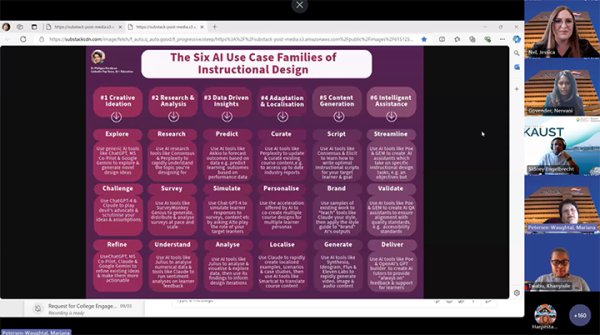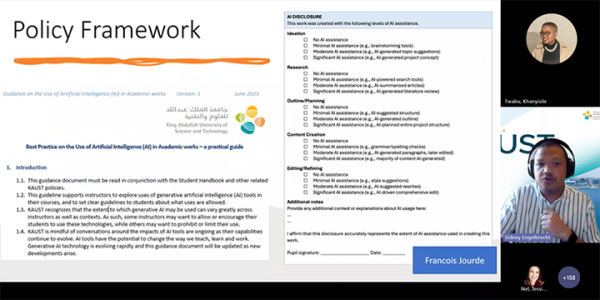
On 6 September 2024, the Unisa AI Innovators task team hosted a highly engaging and forward-thinking webinar titled “Demystifying and destigmatising AI in module design and development”.
This webinar, spearheaded by the AI-Infused Module Design sub-team from the Directorate: Curriculum Development and Transformation (DCDT), highlighted the potential of artificial intelligence (AI) to change the face of education at Unisa. The DCDT, part of Unisa’s Department of Tuition Support and Facilitation of Learning (DTSFL), supports the development of transformative, technology-enhanced learning environments. The focus of the webinar was to showcase how AI can create adaptive, student-centred modules aligned with Unisa’s CODeL (comprehensive, open, distance and e-learning) strategy, supporting the university’s 2030 vision.
The session attracted widespread interest from across the university, with participants eager to explore the evolving role of AI in module development and student support.
The Unisa AI Innovators, a Senate-recognised task team, leads several AI initiatives across Unisa, including AI-Driven Data Analytics, AI-Driven Research, AI-Enhanced Teaching, Facilitation and Assessment, and AI-Powered Student Support. This session was hosted by the AI-Infused Module Design sub-team, led by Jessica Nel, Curriculum and Learning Development Specialist from the DCDT. Nel opened the webinar by emphasising that the event would focus on practical applications of AI in curriculum design, steering away from common concerns like plagiarism and cheating. Instead, the focus was on how AI could enhance module content and improve student engagement.
Richard Wright, Educational Technologist from Unisa’s Academic Development Open Virtual Hub (ADOVH), showcased a pre-recorded demo of Lwazi, an AI-powered chatbot designed to support students with exam preparation and administrative queries. Wright explained how Lwazi, as part of the AI-Powered Student Support sub-team, is already offering real-time, personalised assistance to Unisa students, helping them navigate their academic journey more efficiently.
Following this, Nervani Govender, Digital Assessment Support Manager from Unisa’s Deputy Registrar: Student Administration and System Integration, delivered an insightful presentation on the technical workings of AI. Govender’s session, titled "AI behind the scenes", gave attendees a glimpse into the backend infrastructure supporting AI-powered tools like Lwazi. She explained how AI could be integrated into various systems at Unisa to automate administrative processes, facilitate communication between students and the university, and enhance learning management systems. Govender’s presentation illustrated the importance of strong technical support in scaling AI solutions to meet the needs of a large, diverse student body.
The panel discussion focused on addressing key ethical, privacy and academic concerns regarding AI integration in module development.

Panel discussion with Mariana Petersen-Waughtal

Panel discussion with Sidney Engelbrecht
Dr Salosh Govender, Curriculum and Learning Development Specialist from the DCDT, delivered an engaging presentation on the importance of developing critical AI literacies for educators. She argued that while AI can significantly enhance teaching and learning, educators must be well-equipped to integrate these tools effectively into their pedagogical practices.
Govender outlined a framework for how AI could be used in module development, particularly in formative assessments and online learning activities, to improve student retention and learning outcomes. She also stressed the importance of continuous evaluation of AI tools to ensure they are being used appropriately and delivering the intended educational benefits. Her presentation highlighted the need for Unisa to prioritise offering professional development programmes for educators to build critical AI literacies, ensuring that faculty members are not only capable of using AI but also able to assess its impact on student success.
To ensure participant engagement, the webinar included several interactive activities, including polls, an interactive whiteboard session and a wind-down mindfulness activity. Early in the event, participants were asked how often they used AI tools in their teaching. Responses varied, with some educators using AI tools regularly while others were just beginning to explore their potential.
Using a word cloud activity, participants shared how they currently use AI in their teaching and module design. Key terms such as "content generation", "student support" and "assessments" emerged, highlighting the wide range of applications participants were already considering. The activity also revealed a significant interest in further developing AI integration in teaching practices.
At the conclusion of the webinar, participants contributed to an interactive whiteboard using the "Start, Stop, Continue" method. Attendees suggested starting practices such as providing clear guidelines for AI use in assessments, stopping the tendency to rely on AI without referencing its use in module content, and continuing to use AI for creative assessments and scenario-building. These insights offer Unisa valuable direction on how to further integrate AI into curriculum development while maintaining academic integrity and enhancing learning experiences.
The feedback from participants was overwhelmingly positive, with many attendees praising the quality of the presentations and the depth of the discussions. Comments from the chat included the following:
Participants expressed a strong desire to continue exploring how AI could further improve module design and student support at Unisa. One attendee remarked, "This was a privilege to be part of!" reflecting the enthusiasm generated by the event.
The Unisa AI Innovators webinar successfully showcased the transformative potential of AI in module design and development. From practical demonstrations to in-depth discussions on ethics, privacy and AI literacies, the event ignited a spark at Unisa on how AI can be used to create personalised, adaptive learning experiences for students. As Unisa continues to embrace digital innovation, the work of the AI-Infused Module Design sub-team and the broader AI Innovators task team will play a key role in shaping the future of education at the institution.
* By Jessica Nel, Curriculum and Learning Development Specialist, Directorate: Curriculum Development and Transformation
Publish date: 2024-09-17 00:00:00.0